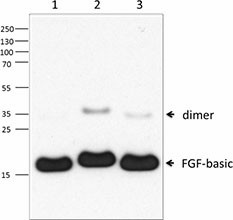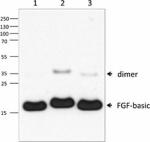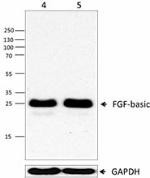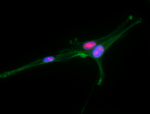- Clone
- A15021A (See other available formats)
- Regulatory Status
- RUO
- Other Names
- Fibroblast growth factor 2 (Fgf-2), Heparin-Binding Growth Factor 2, Basic Fibroblast Growth Factor (BFGF), Fgfb, bFGF
- Isotype
- Mouse IgG2a, κ
- Ave. Rating
- Submit a Review
| Cat # | Size | Price | Quantity Check Availability | Save | ||
|---|---|---|---|---|---|---|
| 688502 | 100 µg | 305 CHF | ||||
FGF-basic, also known as FGFb and FGF-2, is a member of the fibroblast growth factor (FGF) family which includes 23 members. FGFb is expressed in almost all tissues and plays an important role in a variety of normal and pathological processes, including development, wound healing, and neoplastic transformation. FGFb is mitogenic for many cell types, both epithelial and mesenchymal. FGFb shows potent angiogenic activity and has been implicated in tumor angiogenesis. In prostate, bladder, and renal cancers, FGFb regulates the induction of metalloproteinases (MMP) that degrade extracellular matrix proteins, thus facilitating tumor metastasis. FGFb binds to a family of four distinct, high affinity tyrosine kinase receptors, designated FGFR-1 to -4. In addition, FGFb binds to the ECM, and heparan sulfate (HS) is an essential and dynamic regulator of fibroblast growth factor (FGF) signaling. Two fundamentally different crystallographic models have been proposed to explain, at the molecular level, how HS/heparin enables FGF and FGF receptor (FGFR) to assemble into a functional dimer on the cell surface, although there is controversy regarding the exact manner by which this occurs.
Product DetailsProduct Details
- Verified Reactivity
- Human, Mouse
- Antibody Type
- Monoclonal
- Host Species
- Mouse
- Immunogen
- Human FGF-basic, amino acids Ala144-Ser288 (Accession# NM_002006) was expressed in E. coli.
- Formulation
- Phosphate-buffered solution, pH 7.2, containing 0.09% sodium azide.
- Preparation
- The antibody was purified by affinity chromatography.
- Concentration
- 0.5 mg/ml
- Storage & Handling
- The antibody solution should be stored undiluted between 2°C and 8°C.
- Application
-
WB - Quality tested
ICC - Verified - Recommended Usage
-
Each lot of this antibody is quality control tested by Western blotting. For Western blotting, the suggested use of this reagent is 0.5 - 2.0 µg/ml. For immunocytochemistry, a concentration range of 1.0 - 5.0 μg/ml is recommended. It is recommended that the reagent be titrated for optimal performance for each application.
- RRID
-
AB_2629595 (BioLegend Cat. No. 688502)
Antigen Details
- Structure
- Different isoforms with the predicted molecular weight of approximately 18 - 34kD.
- Distribution
-
Brain, retina, pituitary, kidney, placenta, testis, corpus luteum, adrenal glands, monocytes, prostate, bone, liver, cartilage, endothelial cells, and epithelial cells.
- Function
- FGF-basic is a potent angiogenic factor, and plays a key role in various physiological and pathological conditions, including embryonic development, wound repair, inflammation, and tumor growth.
- Interaction
- Fibroblasts, myoblasts, osteoblasts, neuronal cells, endothelial cells, keratinocytes, chondrocytes, astrocytes, oligodendrocytes, and smooth muscle cells.
- Ligand/Receptor
- FGFR-1 (flg), FGFR-2 (bek, K-sam), FGFR3, and FGFR-4 (flg-2); low affinity coreceptor heparin sulfate and heparin sulfate proteoglycans required for full activity.
- Cell Type
- Monocytes, Epithelial cells, Endothelial cells
- Biology Area
- Angiogenesis, Cell Biology, Cell Motility/Cytoskeleton/Structure, Cell Proliferation and Viability, Immunology
- Molecular Family
- Cytokines/Chemokines, Growth Factors
- Antigen References
-
1. Rusnati M, Presta M. 2007. Curr. Pharm. Des. 13:2025.
2. Chaffer CL, et al. 2007. Differentiation 75:831.
3. Cronauer MV, et al. 2003. Eur. Urol. 43:309.
4. Shimizu A, et al. 2001. J. Biol. Chem. 276:11031.
5. Mohammadi M, et al. 2005. Curr. Opin. Struct. Biol. 15:506.
6. Chiou M, et al. 2006. Longaker MT Biochem. Biophys. Res. Commun. 343:644. - Gene ID
- 2247 View all products for this Gene ID
- UniProt
- View information about FGF-basic on UniProt.org
Other Formats
View All FGF-basic Reagents Request Custom Conjugation| Description | Clone | Applications |
|---|---|---|
| Purified anti-FGF-basic | A15021A | WB,ICC |
Compare Data Across All Formats
This data display is provided for general comparisons between formats.
Your actual data may vary due to variations in samples, target cells, instruments and their settings, staining conditions, and other factors.
If you need assistance with selecting the best format contact our expert technical support team.


 Login / Register
Login / Register 


















Follow Us